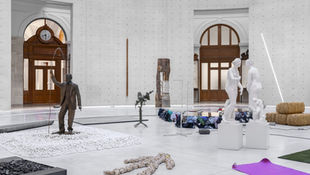
From Balzac To Proust
The notion of French identity has been the subject of intense literary, philosophical, and political scrutiny since the French Revolution. Between the fall of the monarchy in 1789 and the outbreak of World War I in 1914, France underwent profound transformations - revolution, restoration, empire, and republic - that shaped both its national self-conception and the lives of its citizens. Literature, particularly the novel, became a powerful medium through which writers explored and interrogated this evolving sense of self. This essay traces the trajectory of French identity from Honoré de Balzac’s panoramic realist depictions of post-Napoleonic France to Marcel Proust’s introspective and psychological reimagining of identity in the early 20th century. While Balzac sought to catalogue the social order as a whole, Proust turned inward, illuminating how identity is shaped by memory, desire, and perception.

Honoré de Balzac wrote during a period of intense social and political flux. The post-Revolutionary era, marked by the rise and fall of Napoleon and the subsequent restoration of the Bourbon monarchy, saw the destabilisation of ancien régime hierarchies and the emergence of a bourgeois class that both emulated and subverted aristocratic norms. In La Comédie humaine, Balzac aimed to create a totalizing portrait of French society, writing over ninety interlinked works that function as a “social encyclopaedia.” Balzac’s novels obsessively detail the lives, ambitions, and failures of individuals attempting to navigate a volatile social order. Characters like Eugène de Rastignac (Le Père Goriot) and Lucien de Rubempré (Illusions perdues) embody the central tension between inherited aristocratic values and the capitalist ethos of self-made success. In Balzac’s universe, identity is closely tied to class, occupation, and appearance—external markers that define one’s social position and dictate one’s destiny.
Balzac’s Paris is a stage upon which individuals perform identity according to societal expectations. The emphasis on clothes, furniture, and manners throughout his works signals the performative nature of social identity. However, the potential for upward mobility also introduces anxiety about authenticity and imposture. This theme - what it means to “pass” as something one is not - complicates notions of stable identity and prefigures the more psychological inquiries of later writers. Despite his monarchist leanings, Balzac depicts a France composed of competing ideologies and regional identities. In works like Les Paysans and Eugénie Grandet, he contrasts the rural provinces with the modernising force of Paris, highlighting the fragmentation of French identity along urban-rural, aristocratic-bourgeois, and traditional-modern lines. Thus, for Balzac, French identity is not a unified essence but a composite of social, economic, and regional forces.
The late 19th century witnessed a profound shift in the intellectual and cultural climate of France. The Dreyfus Affair (1894–1906), the rise of psychoanalysis, and the increasing influence of aestheticism and symbolism all contributed to a growing sense of crisis regarding truth, selfhood, and national purpose. The Dreyfus Affair symbolised a national identity crisis in which questions of justice, truth, and anti-Semitism came to the fore. The fracture between the Dreyfusards and anti-Dreyfusards exposed deep fissures in French republicanism and underscored the instability of the values underpinning national unity. Writers such as Baudelaire, Flaubert, and Mallarmé began to turn away from Balzacian realism toward a more introspective and symbolic mode of representation. This shift paved the way for the intensely psychological and philosophical explorations of identity in Proust. Where Balzac catalogued social types, these writers sought to express interior states, dreams, and sensations - thus reconfiguring identity as a fluid, elusive process rather than a fixed social role.

Marcel Proust’s À la recherche du temps perdu represents a culmination and radical transformation of the literary exploration of French identity. While Balzac constructed a social panorama, Proust created a temporal and psychological labyrinth, using the narrator’s memories to explore how identity is formed and reformed over time. Proust’s famous madeleine episode introduces his central innovation: the idea that identity is not coherent or static but dispersed across time and accessible only through involuntary memory. The self, for Proust, is not a unified entity but an accumulation of impressions, associations, and forgotten sensations that defy linear narration.
Like Balzac, Proust is preoccupied with class and social climbing, particularly in the salons of Paris. However, he treats social identity with greater irony and philosophical detachment. Characters such as the Duc de Guermantes and Charlus oscillate between grandeur and absurdity, revealing the performative and often arbitrary nature of social roles. In contrast to Balzac’s realist documentation, Proust offers a deconstruction of the very categories—nobility, bourgeoisie, artist—through which identity had traditionally been understood. Though less overtly political than Balzac’s, Proust’s work is deeply concerned with national identity, particularly as it intersects with memory, art, and war. The later volumes of La Recherche reflect on the devastation of World War I and the erosion of a certain idea of France, one linked to aristocratic elegance and aesthetic cultivation. In this sense, Proust mourns not just personal lost time but also a lost cultural and national identity.
From Balzac to Proust, French literature reflects a profound transformation in the understanding of identity. Balzac’s detailed realism sought to stabilise identity through social typology and moral order, even as his characters struggled against the flux of modern life. Proust, inheriting and dismantling this tradition, reoriented the novel around the unstable processes of memory, perception, and desire. In moving from a sociology of identity to its phenomenology, French literature mirrored broader cultural shifts: from certainty to ambiguity, from external order to internal experience. Through their monumental works, Balzac and Proust offer complementary visions of what it meant to be French in an age of constant transformation, a tension that continues to resonate in contemporary debates over national identity.





